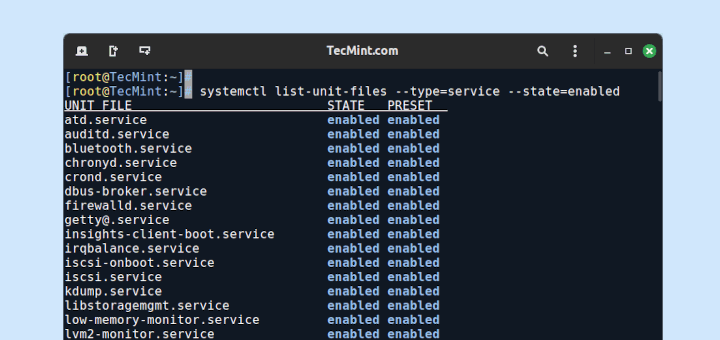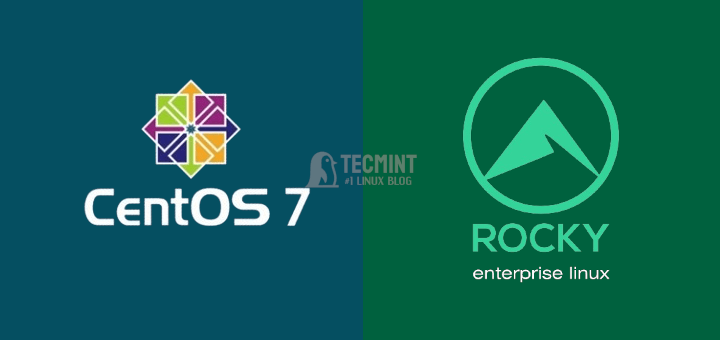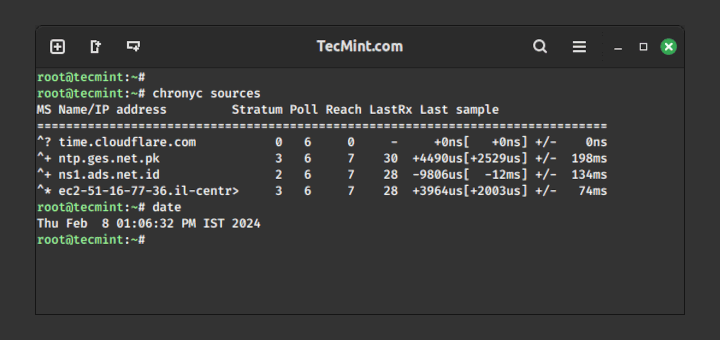In this article, we will show how to remove old/unused kernel images on RHEL/CentOS/Fedora systems. However, before you remove an old kernel, it is important to keep your kernel up to date; install the latest version in order to leverage new kernel functions and to protect your system from vulnerabilities that have been discovered in older versions.
To install or upgrade to latest kernel version in RHEL/CentOS/Fedora systems, read this guide:
Attention: On the contrary, is recommended to keep at least one or two old kernels to fall back to in case there is a problem with an update.
To display the current version of Linux (kernel) running on your system, run this command.
# uname -sr Linux 3.10.0-327.10.1.el7.x86_64
List All Installed Kernels on System
You can list all kernel images installed on your system like this.
# rpm -q kernel kernel-3.10.0-229.el7.x86_64 kernel-3.10.0-229.14.1.el7.x86_64 kernel-3.10.0-327.3.1.el7.x86_64 kernel-3.10.0-327.10.1.el7.x86_64
Removing Old/Unused Kernels on CentOS/RHEL
You need to install yum-utils, which is an assortment of utilities that integrate with yum to make it more powerful and easier to use, by extending its original features in several different ways.
# yum install yum-utils
One of these utilities is package-cleanup which you can use to delete old kernel as shown below, the count flag is used to specify the number of kernels you want to leave on the system.
# package-cleanup --oldkernels --count=2
Loaded plugins: fastestmirror, langpacks, product-id, versionlock --> Running transaction check ---> Package kernel.x86_64 0:3.10.0-229.el7 will be erased ---> Package kernel.x86_64 0:3.10.0-229.14.1.el7 will be erased ---> Package kernel-devel.x86_64 0:3.10.0-229.1.2.el7 will be erased ---> Package kernel-devel.x86_64 0:3.10.0-229.14.1.el7 will be erased --> Finished Dependency Resolution Dependencies Resolved =============================================================================================================================================================================================== Package Arch Version Repository Size =============================================================================================================================================================================================== Removing: kernel x86_64 3.10.0-229.el7 @anaconda 131 M kernel x86_64 3.10.0-229.14.1.el7 @updates 131 M kernel-devel x86_64 3.10.0-229.1.2.el7 @updates 32 M kernel-devel x86_64 3.10.0-229.14.1.el7 @updates 32 M Transaction Summary =============================================================================================================================================================================================== Remove 4 Packages Installed size: 326 M Is this ok [y/N]: y Downloading packages: Running transaction check Running transaction test Transaction test succeeded Running transaction Erasing : kernel-devel.x86_64 1/4 Erasing : kernel.x86_64 2/4 Erasing : kernel-devel.x86_64 3/4 Erasing : kernel.x86_64 4/4 Loading mirror speeds from cached hostfile * base: centos.mirror.snu.edu.in * epel: repo.ugm.ac.id * extras: centos.mirror.snu.edu.in * rpmforge: kartolo.sby.datautama.net.id * updates: centos.mirror.snu.edu.in Verifying : kernel-3.10.0-229.el7.x86_64 1/4 Verifying : kernel-devel-3.10.0-229.14.1.el7.x86_64 2/4 Verifying : kernel-3.10.0-229.14.1.el7.x86_64 3/4 Verifying : kernel-devel-3.10.0-229.1.2.el7.x86_64 4/4 Removed: kernel.x86_64 0:3.10.0-229.el7 kernel.x86_64 0:3.10.0-229.14.1.el7 kernel-devel.x86_64 0:3.10.0-229.1.2.el7 kernel-devel.x86_64 0:3.10.0-229.14.1.el7 Complete!
Important: After running the above command, it will remove all old/unused kernels and keep the current running and old latest kernel as backup.
Removing Old/Unused Kernels on Fedora
Fedora now uses dnf package manager, a new version of yum package manager, so you need to use this command below to remove old kernels on Fedora.
# dnf remove $(dnf repoquery --installonly --latest-limit 2 -q)
Another alternative way to remove old kernels automatically is setting the kernel limit in yum.conf file as shown.
installonly_limit=2 #set kernel count
Save and close the file. The next time you run an update, only two kernels will be left on the system.
You may also like to read these following related articles on Linux kernel.
- How to Load and Unload Kernel Modules in Linux
- How to Upgrade Kernel to Latest Version in Ubuntu
- How to Change Kernel Runtime Parameters in a Persistent and Non-Persistent Way
In this article, we described how to remove old/unused kernel images on RHEL/CentOS/Fedora systems. You can share any thoughts via the feedback from below.








How to remove from boot menu old 5.8.7 and 5.8.9
Configuration file for dnf:
/etc/dnf/dnf.conf.Correct way to remove old kernels – there might be other ways but this works for sure:
The dnf command you list is wrong still and whoever did the Fedora wiki page is wrong. The below shows that –latest-limit 1 goes from newest to oldest, not the other way around. In F26/F27 package-cleanup does not work and the command you show does not work – it removes the newer kernels.
Actually,
Does list the older kernel. It looks like =[nospace]-X is required for this to work in F27 at least, the wiki has no = and a space. Positive numbers go from new to old and negative numbers start at the oldest.
My method above is longer but would allow you to pick random kernels for the keep list,
usage: dnf repoquery...
In Fedora 26 this worked:
$ sudo dnf remove $(dnf repoquery –installonly –latest-limit=-2 -q)
@Jason
Thanks for the useful feedback, this is the same command given in the Yum to DNF Cheatsheet on the Fedora project website: https://fedoraproject.org/wiki/Yum_to_DNF_Cheatsheet
Error:
Problem: The operation would result in removing the following protected packages: kernel-core
That is because
Lists your current kernel
Seems like a safer alternative.
@Micheal
We’ll cross-check this, thanks for mentioning. But that is command provided in the Yum to DNF Cheatsheet on the Fedora project website: https://fedoraproject.org/wiki/Yum_to_DNF_Cheatsheet
but actually the only command working correctly is the one Michael provided.
Hi Aaron,
Under Remove Old/Unused Kernels On Fedora. In the below command
-2hyphen must be removed in order for the command to work.It should be,
Thank you
@N30xMind,
Thanks for pointing out, corrected in the article..
“Attention: On the contrary, is recommended to keep at least one or two old kernels to fall back to in case there is a problem with an update”
I fully agree on that. And you know why? Well.. RedHat managed to get the following bug to exist since 2015 and still not being fixed fully.
https://access.redhat.com/solutions/2172881
So yes, you need to be sure that you keep something that works.
On the other hand, SUSE automatically can maintain a definable number of kernels and purge old kernels automatically if you wish.
Now, SUSE is better tested, automatically tested, is supported better, cheaper, better tooled. You simply are wondering why someone would want to use fedora, centos or rhel. The cool parts that SUSE can accomplish are major version updates without problems. RH 6 to 7? Good luck with that. And SUSE also can do a full upgrade of a service pack, patches and you can fully (!) roll back too. In minutes.
@R. Hell
Thanks for the useful insights on openSUSE, i suppose it’s high time i started using it to realize some of the benefits you have mentioned above. Once again, many thanks for writing back.
Hey Aaron,
What if you want to remove a newer kernel. I.e. after a kernel update the system crash so you need to use the old one. Can one use this method to remove the newest and unused kernel, not the old one?
Thank you for your excellent articles!
@Mauricio
Not really, you can run this command to remove a kernel(preferably a new kernel):
#yum remove kernel-4.12.10-1.el7.elrepo.x86_64
OR
#rpm – -erase kernel-4.12.10-1.el7.elrepo.x86_64
Finally, thanks too for the useful feedback.